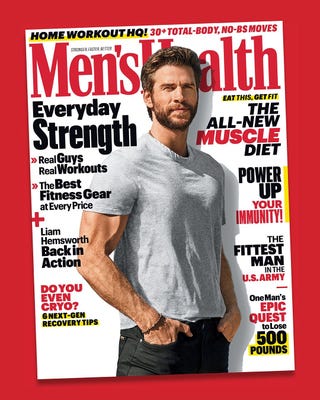Before actor and activist Kendrick Sampson, of HBO’s Insecure, spoke with certainty about his anxiety, all he knew was that he had intense stomach pain.
“I just thought sometimes my stomach hurt really, really bad to the point where I was doubled over,” Sampson says. “I had no idea it was connected to my nervous system.”
At 18, Sampson moved to Los Angeles to pursue acting, but it wasn’t a smooth transition. “My old therapist used to say, ‘The four most stressful things in life are a death in the family, a breakup, financial problems, and moving,'” he says. Sampson checked all the boxes except death. “It really exacerbated my mental health.”
One way of coping with his anxiety was to retreat. “I would do my best to distance myself from the person who triggered it. If I was in a conflict with my mom I would be like, ‘Mom, you’re not going to hear from me for a while, this is too stressful.'”
Another way Sampson coped was more destructive. “Some people have alcohol that they turn to or substance abuse. I would just really need to have sex.”
The Catalyst for Change
As the years went by, Sampson says his symptoms became significantly worse and he started to develop ulcers. One day, when he was 21, Sampson’s “insides were twisting for 12 hours.” He went to the hospital, where a series of doctors told him the culprit was stress and anxiety.

Subscribe to Men’s Health
SHOP NOW
“You only need to send me to the hospital once to get my attention,” he says.
At first, Sampson says he avoided therapy, because he’d had bad experiences with it as a child. Instead, he tried to change the other problematic aspects of his life.
“There were periods of it where I would say ‘I’m going to be celibate and that will take care of it.’ I went a whole year one time. But it didn’t ever address the issue. And so, the anxiety got worse.”
When Sampson was about 25, he started connecting that the way he was engaging in sex was tied to his anxiety, and he sought therapy.
The Rewards
Now, at 32, Sampson manages his anxiety by going to therapy every week and getting outside as often as he can. But he knows not everyone has access to the same resources he does, and that’s something he wants to change. That’s where BLD PWR (pronounced “build power”), Sampson’s non-profit, comes in.
Launched in March 2019, “BLD PWR was created to perpetuate liberation culture,” Sampson says. They do that by teaching people about activism. One example of that is educating people about existing legislation. Another is connecting people with organizations they may not be aware of, like Moms4Housing, which works towards housing reform, or JusticeLA’s grassroots incarceration work.
Sampson’s advocacy work also helps him keep control of his mental health. “When we feel like we can’t do anything, it adds to our anxiety,” he says. “When we’re a part of the solution and seeking out the best solutions, it actually helps.”
Right now, Sampson wants to be part of the solution for those in jail. “We’ve been working on reducing the prison population. Most people who are going to be released in the next year, why not just release them now?” he says.
By releasing prisoners early, Sampson and others hope it will help mitigate the number of prisoners who catch COVID-19. As of April 20, 2020, the Federal Bureau of Prisons reports that nearly 500 federal inmates have tested positive for the coronavirus.
“We don’t want to empty out beds and reduce the prison population, only to exponentially fill it back up with people who have mental illnesses,” he says.
For those Insecure fans, Sampson says that his past has helped informed his character, Nathan, who he’s played throughout season three of the show.
SPOILER ALERT: In the season three finale, Nathan met up with Issa (played by Issa Rae) to explain why he’d ghosted her. He tried to be vulnerable by talking around his mental health, saying sometimes he gets “really down and kind of negative.” It was clear he was a little hesitant, and a little embarrassed, but also maybe confused.
“In that moment, Nathan is trying to work through what’s happened to him,” says Sampson. “But men are taught not to talk about their feelings. Add the many layers of being a black man—generational trauma and PTSD—that contribute to poor mental health, and how we’re taught to not show any sign of weakness.”
If mirroring Nathan’s admission or keeping up on your own mental health feels like too much, Sampson has some advice: “Things are abnormally stressful right now, so we have to be kind to ourselves. Keep striving to reach goals that keep you productive without being harmful and hard on yourself and beatings yourself up. Because the government and COVID-19 are doing that enough for us.”
Source: Read Full Article
